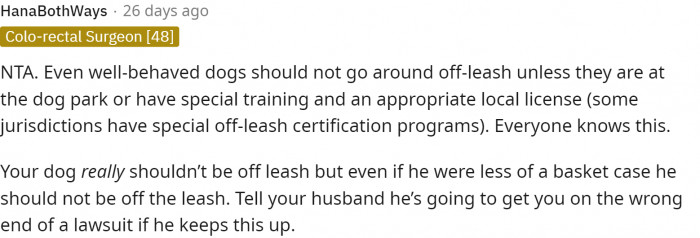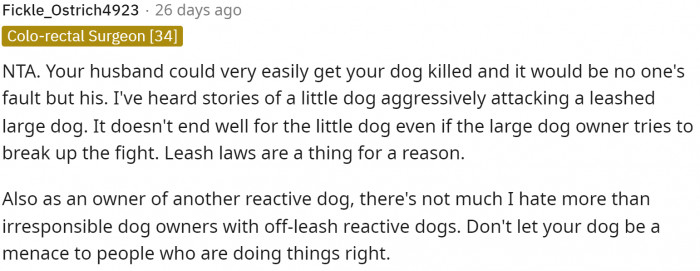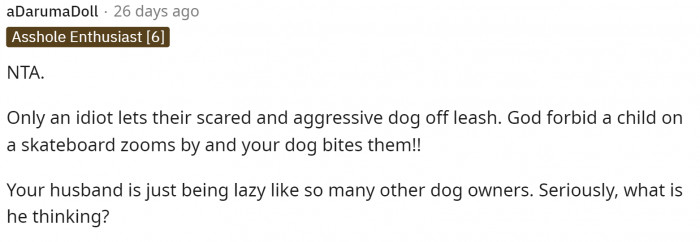Couple Argues Over Keeping Dog Off Leash When Outdoors
We're back with another look into an AITA thread story from Reddit. We love diving into these stories because people usually come on there to spill tea about a situation in their lives and ask for advice on whether or not what they did was right.
We usually love to dissect the story and find out all of the possible perspectives that you can take when reading it. Then we dive into the best comments left on the Reddit post.
Usually, Reddit commenters give their opinion on what they think of the original poster, whether that be NTA, TA, or even ESH. This vote gives them the verdict on their situation.
Today, we'll be going over a story where a wife and her husband can't agree on a proper way to let their dog out of the house. While the wife keeps her dog on a leash, her husband lets her go off-leash, and they can't seem to agree on which way to do things.
The wife's concern is that the dog is unpredictable and could potentially be harmful if provoked, but they really don't know. If you want to know more about this story and what people had to say about it too, then stay tuned as we take a look into it.
Here is the beginning of the post where she explains the dog's situation.

This is when she explains that they can't agree on leaving the dog on a leash or off-leash.

It wasn't long before the first comment rolled in, calling her NTA.

The Dynamics of Couple Conflict
Conflicts between couples over pet care often reveal deeper issues related to communication and shared values. Dr. John Gray, a renowned relationship author, states, "When partners have differing views on responsibilities, it can lead to misunderstandings that strain the relationship." Research highlighted on Dr. Gray's website emphasizes that differing perspectives on responsibility and care can lead to significant relationship strain. Understanding each partner's viewpoint is crucial, as it lays the groundwork for resolution and compromise.
Conflict Resolution and Relationship Dynamics
The disagreement over pet management between partners can reveal deeper relational dynamics. According to Dr. John Gottman, known for his work on marital stability and relationship analysis, conflicts often arise from underlying issues of trust and shared values. When couples clash over seemingly trivial matters, it may be a manifestation of unmet needs or unresolved grievances.
Understanding these dynamics can provide a pathway to resolving conflicts more effectively. For example, exploring why one partner feels strongly about having their dog on a leash can uncover deeper concerns about safety, control, or even personal values regarding discipline and freedom.
People began giving good reasons as to why the dog should just be kept on a leash.

Exactly. Regardless, the dog should be on a leash, but her dog really needs to be on a leash.

Other commenters went straight for the worst-case scenario on the husband's part.

The argument about keeping a dog on a leash can symbolize broader themes of control and trust within the relationship.
According to studies in relational psychology, couples often project their individual anxieties and insecurities onto shared responsibilities, complicating discussions.
Addressing these underlying fears can promote healthier communication and reduce conflict.
Research in social psychology suggests that effective communication is essential during conflicts. The concept of active listening encourages partners to fully understand each other’s perspectives before formulating a response. This approach not only promotes empathy but also reduces the likelihood of escalating disputes into larger conflicts.
Couples are encouraged to engage in 'I' statements, which express personal feelings without placing blame, creating a safer environment for sharing concerns. For instance, saying 'I feel anxious when the dog is off-leash in public' can open a dialogue focused on feelings rather than accusations.
Dogs are very unpredictable and should be leashed at all times.

It's important to leash your dog so that you remain in control of them at all times. They are unpredictable.

People often believe that their dogs are safe because they are nice to them, but ultimately, they could react in any way to a stranger.

What Research Says About Conflict Resolution
Effective conflict resolution strategies are essential for maintaining healthy relationships.
Research indicates that couples who practice active listening and empathy can significantly reduce the likelihood of unresolved conflicts.
Incorporating these techniques during discussions about pet care can foster a collaborative environment and strengthen partnership bonds.
The Importance of Compromise in Relationships
Compromise plays a crucial role in maintaining harmony in relationships. Dr. Elizabeth Dunn's research highlights that successful couples often find ways to acknowledge and validate each other's feelings while also creating solutions that meet both partners' needs. This may involve negotiating rules around pet behavior that both partners can agree upon.
For example, setting boundaries such as allowing the dog off-leash in safe areas while keeping it leashed in more crowded spaces can be a win-win solution. Such agreements foster collaboration and reinforce the idea that both partners' feelings are valid and worth considering.
You just can't risk the dog attacking anyone or another animal.

Exactly that. It's extremely irresponsible.

It's easier on the dog and the human to keep them on a leash.

To navigate pet-related disagreements, couples may find it helpful to establish clear guidelines and responsibilities regarding pet care.
Engaging in regular check-ins about each partner's feelings and expectations can help maintain alignment and prevent future conflicts.
Additionally, seeking couples therapy or workshops focused on communication can enhance conflict resolution skills.
Behavioral experts suggest that regular check-ins about pet care can help couples stay aligned on expectations and responsibilities. Establishing a routine for discussing pet management can prevent misunderstandings and allow both partners to express their evolving feelings and concerns.
Creating a joint pet care plan that includes mutual goals and responsibilities not only enhances cooperation but also strengthens the emotional connection between partners, fostering a shared sense of commitment to their pet's well-being.
Exactly, but her husband knows this and is still trying to keep it off-leash.

Period. Use a leash. She's NTA.

Interesting perspective made by this commenter.

Understanding the Impact of Pets on Relationships
Pets can significantly influence relationship dynamics, often serving as a source of joy and stress.
Studies show that couples who share responsibilities for pet care often report stronger relationship satisfaction, as it fosters teamwork and bonding.
However, differing opinions on pet care can lead to tension, emphasizing the need for open discussions and mutual understanding.
Keep the dog on the leash, but I say still try to train them. Leashing them is still necessary even if they're trained, especially in public spaces.

This is a great perspective as well.

It's always interesting when people come on the AITA Reddit pages to ask for advice on their situation. This one clearly had everyone agreeing that she was indeed NTA and that her husband should be a bit more responsible with the dog.
Despite everyone voting NTA for this situation, what would you have voted for this?
Psychological Analysis
This situation exemplifies how disagreements over pets can reflect deeper relational dynamics. Couples often confront underlying issues of trust and values during such conflicts. Encouraging open dialogue and active listening can promote understanding and facilitate more harmonious resolutions.
Analysis generated by AI
Analysis & Alternative Approaches
Research highlights the complexities of interpersonal conflicts, particularly when they involve shared responsibilities like pet care. Effective communication and compromise are essential for resolving disagreements and maintaining healthy relationships.
By fostering a collaborative approach and prioritizing understanding, couples can navigate conflicts more effectively, ultimately strengthening their bond and ensuring their shared responsibilities are met.
In the face of disagreements, practicing patience and compassion is critical.
Research suggests that couples who approach conflicts with empathy are more likely to reach satisfactory resolutions.
Engaging in exercises designed to enhance emotional connection can also strengthen the relationship amidst challenges.
Analysis & Alternative Approaches
Ultimately, navigating pet care disagreements requires effective communication and a willingness to understand each other's perspectives.
Research emphasizes that couples who work together in resolving conflicts can enhance their emotional bond and relationship satisfaction.
By prioritizing empathy and collaboration, couples can create a more harmonious home environment.



